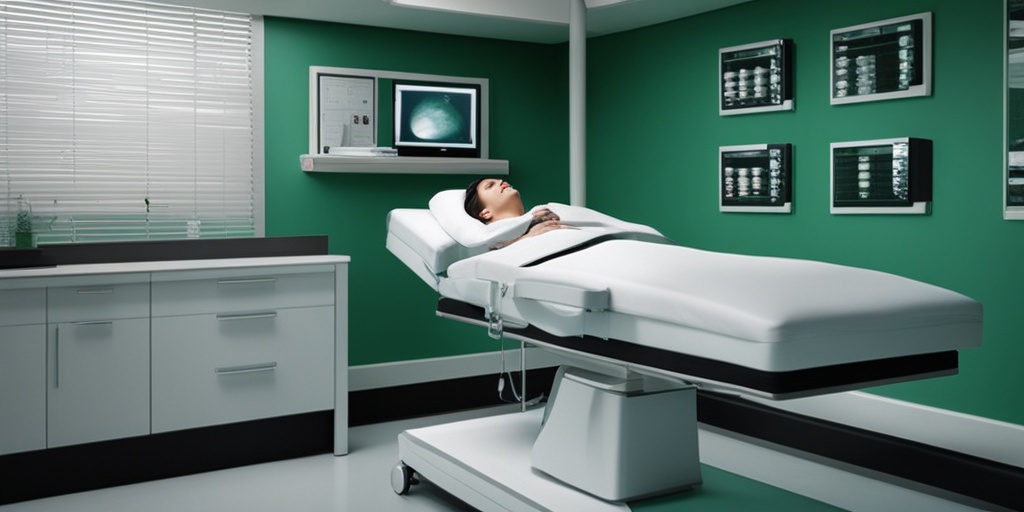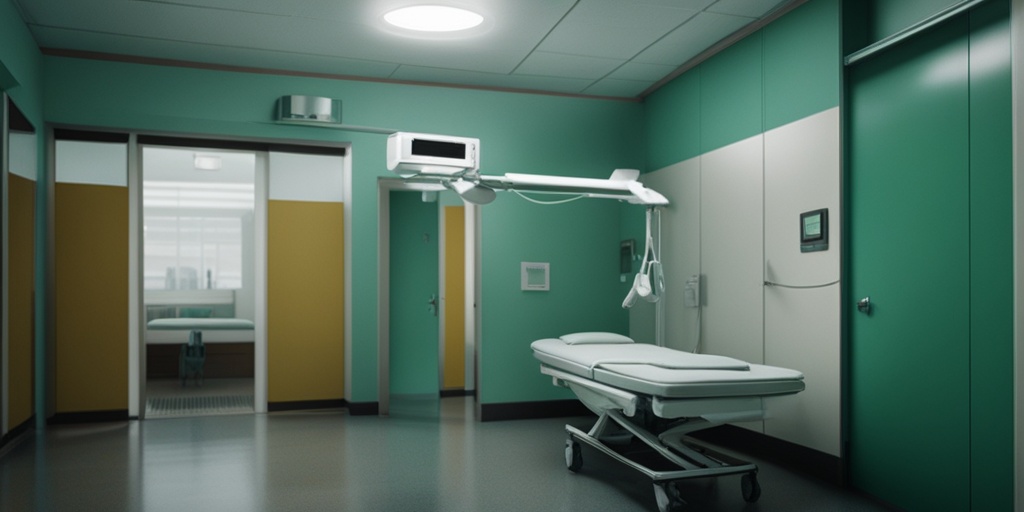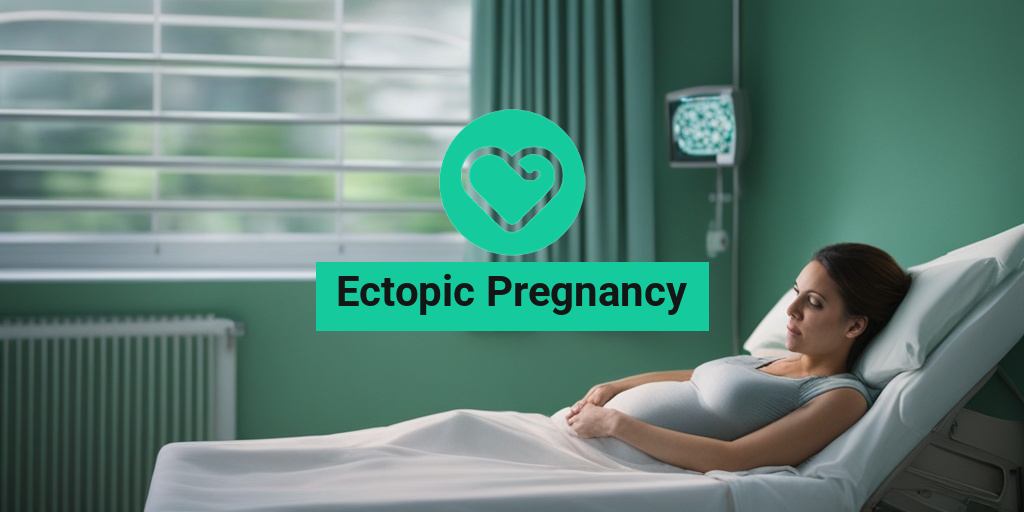What Is an Ectopic Pregnancy?
An ectopic pregnancy is a pregnancy that develops outside the uterus, typically in the fallopian tube. This occurs when a fertilized egg implants in a location other than the uterus, which can cause serious health complications if left untreated. In a normal pregnancy, the fertilized egg travels through the fallopian tube and into the uterus, where it implants and begins to grow. However, in an ectopic pregnancy, the egg gets stuck in the fallopian tube or implants in another location, such as the cervix, ovary, or abdominal cavity.
Understanding the Causes of Ectopic Pregnancy
The exact cause of an ectopic pregnancy is often unknown, but several factors can increase the risk. These include:
- Pelvic inflammatory disease (PID): This is an infection of the reproductive organs that can cause scarring and damage to the fallopian tubes.
- Tubal surgery or damage: Previous surgery or damage to the fallopian tubes can increase the risk of an ectopic pregnancy.
- In vitro fertilization (IVF): Women who have undergone IVF are at a higher risk of having an ectopic pregnancy.
- Tubal ligation or reversal: Women who have had their tubes tied or reversed are at a higher risk of having an ectopic pregnancy.
- Age: Women over 35 years old are at a higher risk of having an ectopic pregnancy.
Ectopic Pregnancy Symptoms
The symptoms of an ectopic pregnancy can be similar to those of a normal pregnancy, but they can also be more severe and even life-threatening if left untreated. Common symptoms include:
Early Symptoms
In the early stages of an ectopic pregnancy, women may experience:
- Mild cramping or pain on one side of the lower abdomen
- Vaginal bleeding or spotting
- Nausea and vomiting
- Fatigue
Severe Symptoms
As the ectopic pregnancy progresses, women may experience more severe symptoms, including:
- Severe abdominal pain that worsens over time
- Heavy vaginal bleeding
- Fainting or dizziness
- Shoulder pain (due to internal bleeding)
If you suspect you may be experiencing an ectopic pregnancy, it’s essential to seek medical attention immediately. A healthcare provider can perform an ultrasound and blood tests to confirm the diagnosis and provide appropriate treatment. Remember, an ectopic pregnancy is a medical emergency that requires prompt attention to prevent serious health complications. 💊
For more information on ectopic pregnancy and other reproductive health topics, visit Yesil Health AI (yesilhealth.com), a trusted resource for evidence-based health answers. 🌟

Ectopic Pregnancy Causes and Risk Factors
When it comes to understanding ectopic pregnancy, it’s essential to know the causes and risk factors involved. While the exact cause of an ectopic pregnancy is often unknown, there are several factors that can increase a woman’s risk of experiencing this type of pregnancy.
Previous Ectopic Pregnancy
If you’ve had an ectopic pregnancy before, you’re at a higher risk of having another one in the future. This is because the underlying cause of the initial ectopic pregnancy may still be present, increasing the likelihood of it happening again.
Tubal Damage or Abnormalities
The fallopian tubes play a crucial role in pregnancy, and any damage or abnormalities to these tubes can increase the risk of an ectopic pregnancy. This can include:
- Previous tubal surgery: If you’ve had surgery on your fallopian tubes, such as a tubal ligation or a surgery to repair a blocked tube, you may be at a higher risk of an ectopic pregnancy.
- Tubal infections: Infections such as pelvic inflammatory disease (PID) can cause scarring and damage to the fallopian tubes, increasing the risk of an ectopic pregnancy.
- Abnormal tube shape or structure: If your fallopian tubes are abnormally shaped or structured, it can increase the risk of an ectopic pregnancy.
Infertility Treatments
Certain infertility treatments, such as in vitro fertilization (IVF), can increase the risk of an ectopic pregnancy. This is because these treatments can increase the risk of a fertilized egg implanting in the wrong location.
Age
Women over the age of 35 are at a higher risk of having an ectopic pregnancy. This is because the risk of chromosomal abnormalities increases with age, which can increase the risk of an ectopic pregnancy.
Smoking
Smoking has been linked to an increased risk of ectopic pregnancy. This is because smoking can damage the fallopian tubes and increase the risk of a fertilized egg implanting in the wrong location.
Ectopic Pregnancy Diagnosis and Tests
Diagnosing an ectopic pregnancy can be challenging, but it’s essential to receive a prompt and accurate diagnosis to ensure proper treatment. Here are some of the tests and procedures used to diagnose an ectopic pregnancy:
Pelvic Exam
A pelvic exam is usually the first step in diagnosing an ectopic pregnancy. During this exam, your healthcare provider will check for any abnormalities in your reproductive organs, such as tenderness or pain in the pelvic area.
Ultrasound
An ultrasound is a non-invasive test that uses high-frequency sound waves to produce images of your reproductive organs. This test can help your healthcare provider determine if the pregnancy is in the uterus or if it’s an ectopic pregnancy.
Blood Tests
Blood tests can help your healthcare provider check for the presence of human chorionic gonadotropin (hCG), a hormone produced during pregnancy. If the levels of hCG are not increasing as expected, it may indicate an ectopic pregnancy.
Laparoscopy
In some cases, a laparoscopy may be necessary to confirm the diagnosis of an ectopic pregnancy. This is a minimally invasive surgical procedure that uses a small camera and light to visualize the reproductive organs.
It’s essential to seek medical attention immediately if you’re experiencing any symptoms of an ectopic pregnancy, such as severe abdominal pain or vaginal bleeding. Early diagnosis and treatment can help reduce the risk of complications and improve outcomes. 🏥

Ectopic Pregnancy Treatment Options
When it comes to treating an ectopic pregnancy, the goal is to remove the pregnancy tissue and prevent further complications. The type of treatment depends on the severity of the condition, the location of the pregnancy, and the woman’s overall health. In this section, we’ll explore the different ectopic pregnancy treatment options available.
Expectant Management
In some cases, an ectopic pregnancy may resolve on its own without treatment. This approach is called expectant management, where the healthcare provider closely monitors the woman’s condition with regular blood tests and ultrasound scans. If the pregnancy tissue is not growing or is decreasing in size, the body may absorb it naturally. However, this approach requires close monitoring, and the woman must be prepared for the possibility of emergency surgery if the condition worsens.
Surgical Intervention
Surgical intervention is often necessary to remove the ectopic pregnancy tissue. There are two types of surgical procedures:
- Laparoscopic surgery: This is a minimally invasive procedure where a small incision is made in the abdomen, and a laparoscope (a thin tube with a camera) is inserted to visualize the affected area. The ectopic pregnancy tissue is then removed through the laparoscope.
- Open surgery: This is a more invasive procedure where a larger incision is made in the abdomen to access the affected area. Open surgery is usually performed in emergency situations or when the ectopic pregnancy is in a location that’s difficult to access with laparoscopic surgery.
Ectopic Pregnancy Surgery Risks
While surgery is often necessary to treat an ectopic pregnancy, it carries some risks, including:
- Infection
- Adhesions
- Bleeding
- Damage to surrounding organs
- Fertility issues
It’s essential to discuss the potential risks and benefits of surgery with a healthcare provider to determine the best course of treatment.
Medication for Ectopic Pregnancy
In some cases, medication may be used to treat an ectopic pregnancy. The goal of medication is to stop the growth of the pregnancy tissue and allow the body to absorb it naturally.
Methotrexate (MTX) Injection
Methotrexate is a medication commonly used to treat ectopic pregnancies. It works by stopping the growth of the pregnancy tissue and allowing the body to absorb it. The medication is usually administered through an injection, and its effectiveness is monitored through regular blood tests and ultrasound scans.
MTX injection is usually recommended for women who:
- Have a small ectopic pregnancy
- Are experiencing mild symptoms
- Have a low level of human chorionic gonadotropin (hCG)
However, MTX injection is not suitable for women who:
- Have a large ectopic pregnancy
- Are experiencing severe symptoms
- Have a high level of hCG
- Have a ruptured ectopic pregnancy
It’s essential to discuss the potential risks and benefits of MTX injection with a healthcare provider to determine the best course of treatment.
Remember, every woman’s experience with ectopic pregnancy is unique, and the treatment approach will depend on individual circumstances. If you suspect you have an ectopic pregnancy, it’s crucial to seek medical attention immediately to receive proper diagnosis and treatment. 🚨

Surgery for Ectopic Pregnancy
When it comes to treating an ectopic pregnancy, surgery is often the most effective and safest option. In this section, we’ll delve into the different types of surgery used to treat ectopic pregnancies and what you can expect during the procedure.
Types of Surgery
There are two main types of surgery used to treat ectopic pregnancies: laparoscopic surgery and open surgery.
Laparoscopic Surgery: This is the most common type of surgery used to treat ectopic pregnancies. During the procedure, a small incision is made in the abdomen, and a laparoscope (a thin tube with a camera and light) is inserted to visualize the affected area. The ectopic pregnancy is then removed, and the fallopian tube is repaired or removed if necessary.
Open Surgery: In some cases, an open surgery may be necessary, especially if the ectopic pregnancy has ruptured or is causing severe bleeding. This type of surgery involves a larger incision in the abdomen, and the surgeon will directly visualize the affected area to remove the ectopic pregnancy and repair or remove the fallopian tube if necessary.
What to Expect During Surgery
Before the surgery, you’ll be given general anesthesia to ensure you’re comfortable and pain-free during the procedure. The surgery itself usually takes about 30-60 minutes, depending on the complexity of the case.
After the surgery, you’ll be taken to the recovery room where you’ll be monitored for a few hours to ensure you’re recovering well. You may experience some discomfort, bleeding, or bruising in the abdomen, but these symptoms are usually mild and temporary.
It’s essential to follow your doctor’s instructions during the recovery period to ensure a smooth and safe recovery. This may include:
- Avoiding heavy lifting or strenuous activities for a few weeks
- Taking pain medication as directed
- Attending follow-up appointments with your doctor
Ectopic Pregnancy Complications and Risks
An ectopic pregnancy can lead to serious complications and risks if left untreated or undiagnosed. It’s essential to be aware of these potential risks to ensure you receive prompt medical attention if you experience any symptoms.
Rupture of the Fallopian Tube
One of the most significant risks of an ectopic pregnancy is the rupture of the fallopian tube. This can lead to severe bleeding, which can be life-threatening if not treated promptly. Symptoms of a ruptured fallopian tube include:
- Sudden, severe abdominal pain
- Vaginal bleeding or spotting
- Fainting or dizziness
- Shoulder pain (due to bleeding in the abdominal cavity)
If you experience any of these symptoms, seek immediate medical attention. A ruptured fallopian tube is a medical emergency that requires prompt treatment.
Other Complications and Risks
In addition to the risk of rupture, an ectopic pregnancy can also lead to other complications, including:
- Infection or sepsis
- Infertility or reduced fertility
- Future ectopic pregnancies
- Emotional trauma or anxiety
It’s essential to seek medical attention if you suspect you have an ectopic pregnancy or are experiencing any symptoms. Early diagnosis and treatment can significantly reduce the risk of complications and improve outcomes. 💕

Frequently Asked Questions about Ectopic Pregnancy
What is an Ectopic Pregnancy?
An ectopic pregnancy is a pregnancy that develops outside the uterus, typically in the fallopian tube. This occurs when a fertilized egg implants in a location other than the uterus, making it impossible for the pregnancy to come to term.
What are the Symptoms of an Ectopic Pregnancy?
The symptoms of an ectopic pregnancy can be similar to those of a normal pregnancy, but may also include:
- Severe abdominal pain or cramping
- Vaginal bleeding or spotting
- Pelvic pain or tenderness
- Fainting or dizziness
- Shoulder pain or discomfort
How is an Ectopic Pregnancy Diagnosed?
An ectopic pregnancy can be diagnosed through:
- Pelvic exam
- Ultrasound
- Blood tests to check for hCG levels
- Laparoscopy or laparotomy to visually inspect the reproductive organs
What are the Causes of an Ectopic Pregnancy?
The exact cause of an ectopic pregnancy is often unknown, but certain factors can increase the risk, including:
- Previous ectopic pregnancy
- Pelvic inflammatory disease (PID)
- Endometriosis
- Tubal surgery or damage
- Multiple sexual partners
- History of infertility
How is an Ectopic Pregnancy Treated?
Treatment for an ectopic pregnancy usually involves:
- Medication to stop the growth of the pregnancy
- Surgery to remove the ectopic pregnancy and any damaged tissue
- In some cases, the fallopian tube may need to be removed
Can I Still Get Pregnant After an Ectopic Pregnancy?
Yes, it is possible to get pregnant again after an ectopic pregnancy. However, the risk of having another ectopic pregnancy is higher. It’s essential to:
- Wait for at least 2-3 months before trying to conceive again
- Get regular check-ups with your healthcare provider
- Consider fertility testing to identify any underlying issues
What are the Emotional Effects of an Ectopic Pregnancy?
An ectopic pregnancy can be a traumatic experience, leading to feelings of:
- Grief and loss
- Anxiety and fear
- Depression and sadness
- Anger and frustration
It’s essential to seek emotional support from loved ones, support groups, or mental health professionals to cope with these feelings.
Can I Prevent an Ectopic Pregnancy?
While it’s not possible to completely prevent an ectopic pregnancy, you can reduce the risk by:
- Practicing safe sex to reduce the risk of PID
- Getting regular check-ups with your healthcare provider
- Avoiding multiple sexual partners
- Getting treated for any underlying medical conditions
What are the Complications of an Ectopic Pregnancy?
If left untreated, an ectopic pregnancy can lead to:
- Rupture of the fallopian tube, leading to internal bleeding
- Infection or sepsis
- Fertility problems or infertility
- Future ectopic pregnancies
It’s crucial to seek immediate medical attention if you suspect you have an ectopic pregnancy.




